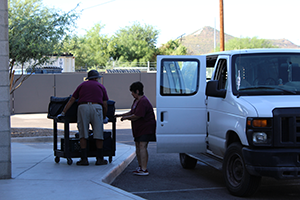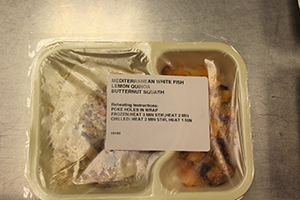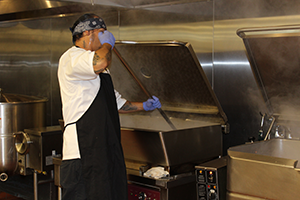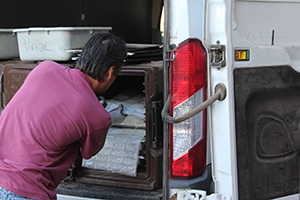Serving More Than Just a Meal
For older adults who are food insecure, there are many barriers to receiving nutritious meals. But, in the Pima County area, community partners are coming together to reduce these barriers.
The DES Division of Aging and Adult Services (DAAS) contracts with local community partners to provide an array of different services, including home-delivered and congregate meals. Four organizations (Community Food Bank of Southern Arizona, Pima Council on Aging (PCOA), Catholic Community Services and Lutheran Social Services of the Southwest), have partnered to develop, cook, and deliver home and congregate meals in their shared region.
The partnership began when PCOA brought the organizations together to discuss a commercial kitchen. It’s “official start” was prompted when Community Food Bank received a donor to help with the funding mechanism. “We’re all committed to this cause, so we had to ask, ‘How do we get there?’” said Abby Rosen, Program Manager of the Caridad Community Kitchen Community Food Bank.
“One of the things we realized is that the elder population is food insecure, and the elder population is growing,” said Michael McDonald, CEO of Community Food Bank of Southern Arizona. “Therefore, food insecurity is growing. Diet-related disease among elders affects overall health. And then there’s the social isolation piece…”

“For some of the folks we provide meals for, it’s the only meal they’re getting,” said Antonio Estrada, Older Americans Act Program Director at PCOA. “We know it’s nutritionally balanced, and we know it’ll be good for their health.”
Lutheran Social Services of the Southwest and Catholic Community Services of Southern Arizona drivers may provide older adults meals for the week, but their outreach goes beyond. Drivers are also trained in observation skills to conduct welfare checks for those who are 60 years and older, who may have mobility issues, or are unable to prepare meals for themselves. Older adults know that drivers deliver meals on certain days and times of the week, so drivers know if someone doesn’t answer the door, there may be a problem.
“So, being able to be part of a team who also does wellness checks felt like it was the right use of our kitchen. We were looking at different ways we could use the kitchen and said, ‘Wow, this hits three of our top four strategic priorities.’”

“There’s much more to this service that we’re providing,” said Debbie Adams, Sr. VP and Chief Operating Officer at PCOA. “Food is a very important part, but so many of our folks are also very isolated because they are homebound. So, even in that five to ten-minute interaction, that’s very important as to what’s happening to that person.”
To adhere to Arizona health code, the drivers have six hours to deliver meals or place them back into cooling temperature. While they can’t take an extensive time at each house to which they deliver, that ten-minute interaction may be the only interaction the individual has all day.
Between home-delivered meals and congregate meal sites, the opportunity for older adults to receive social interaction is extremely important to their overall well-being.
The nutrition program must follow Title III nutrition guidelines of the federal Older Americans Act. The Program Director with Catholic Community Services of Southern Arizona, in partnership with the Program Manager of the Caridad Community Kitchen, developed menus that would expand older adults’ palettes, while also being nutritious. They recently introduced quinoa and bok choy, which wasn’t a huge hit right away, but older adults came to respect it.

In the last twelve months, Community Food Bank’s Senior Meals kitchen volunteers provided more than 6,000 hours to help kitchen staff and culinary arts students prepare meals for older adults.
Kitchen staff are graduates of the Caridad Culinary Training Program, and during that program, also graduated from the DES Supplemental Nutrition Assistance Program Career Advancement Network (SNAP CAN) program. The Arizona SNAP CAN is a community-based employment and training program that provides employment readiness services to eligible SNAP recipients. Community Food Bank’s kitchen—Caridad Community Kitchen—is led by two SNAP CAN graduates.

While Community Food Bank of Southern Arizona operates and staffs the kitchen, PCOA secures the funding that administers the contract with Catholic Community Services of Southern Arizona and Lutheran Social Services of the Southwest to manage the nutrition program; these community partner organizations staff the nutrition program, determine eligibility, and deliver the meals to home and congregate meal sites. Each weekday, 1,200 senior meals are prepared to be delivered to homes and congregate meal sites.
For more information on congregate and home-delivered meals in Pima County, visit the Pima Council on Aging.
By Isabella Neal

